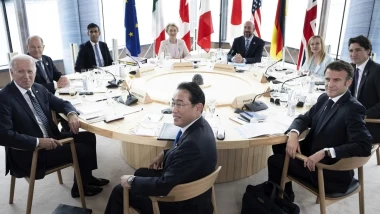G7 countries, EU plan new sanctions against banks using Russia's alternative to SWIFT, SPFS, to evade Western sanctions
- Proposed sanctions target creditors in third countries using SPFS***- G7 summit in Italy in June to provide direction on handling frozen Russian assets***
G7 countries and the European Union are deliberating potential sanctions against banks in third countries that utilize Russia’s System for Transfer of Financial Messages (SPFS), an alternative to SWIFT, to circumvent Western sanctions. These discussions are taking place ahead of the G7 summit in Italy this June.
The proposed sanctions target creditors in third countries using SPFS. Although specific measures have yet to be finalized, different countries may adopt varying approaches to these restrictions. The measures are being developed in coordination with the European Union.
SPFS was established as a Russian alternative to SWIFT to ensure the uninterrupted transmission of financial messages domestically and internationally. According to Elvira Nabiullina, President of the Central Bank of the Russian Federation, 159 foreign participants from 20 countries have already connected to the system.
The European Union is also considering banning the use of SPFS as part of a new package of sanctions against Russia. This move aims to further isolate Russia economically and limit its ability to bypass Western financial restrictions.
Why this matters: The proposed sanctions have significant implications for global financial systems and international relations, as they aim to tighten economic pressure on Russia. If implemented, these measures could lead to further economic isolation of Russia and have a ripple effect on the global economy.
The United States has been particularly vocal about the need to address financial institutions assisting Russia in evading sanctions. An executive order issued by the Biden administration in December threatened punitive measures against such institutions. U.S. Deputy Secretary of State Kurt Campbell highlighted that the primary focus is on Chinese companies and financial institutions systematically supporting Russia. “There will be steps that are taken not just by the United States but other countries signaling our profound displeasure about what China is seeking to do in its relationship with Russia on the battlefield in Ukraine,” Campbell stated.
Deputy U.S. Treasury Secretary Wally Adeyemo emphasized that Chinese firms must choose between doing business with Western economies or supporting Russia’s war efforts. “Chinese firms can either do business in our economies or they can equip Russia’s war machinery with dual-use goods. They can’t continue to do both,” Adeyemo asserted.
The G7 leaders’ summit in Italy next month is expected to provide political direction on how to handle billions of dollars’ worth of frozen Russian assets. Adeyemo hopes that progress will be made on seizing these assets, sending a clear message to Russia about the international community’s resolve.
The G7 and the EU continue to discuss these potential sanctions, and the broader implications for global financial systems and international relations remain significant. The measures aim to tighten the economic pressure on Russia while addressing the role of third-country banks in facilitating transactions that undermine Western sanctions.
